Saudi Arabia is in the midst of an unprecedented transformation. Far beyond simply diversifying its economy, Vision 2030 is fundamentally reshaping the nation, its industries, and its people. For businesses operating within this dynamic landscape, the mandate is clear: adapt or be left behind. While meeting regulatory compliance, such as Saudization targets, remains crucial, the true competitive advantage for Saudi businesses now lies “beyond compliance” – in embracing strategic upskilling to unlock their workforce’s full potential and accelerate their contribution to Vision 2030’s ambitious goals.
1. Vision 2030: The Imperative for a Future-Ready Workforce
At the heart of Vision 2030 is the Human Capability Development Program (HCDP), a comprehensive strategy designed to ensure Saudi citizens possess the capabilities required for a globalized, knowledge-based economy. As outlined by the official Vision 2030 website, the HCDP aims to “enhance the competitiveness of national capabilities globally” by fostering lifelong learning and developing future skills across all sectors.
The drive for economic diversification away from oil is creating entirely new industries and expanding existing ones at an incredible pace. Sectors such as tourism, entertainment, logistics, advanced manufacturing, and renewable energy are experiencing exponential growth, each demanding specialized skills that may not have been prevalent in the past. For example, projects like NEOM and the Red Sea Project require highly specialized talent in areas ranging from sustainable urban development to cutting-edge hospitality management.
Furthermore, Saudization remains a critical national priority. While a regulatory requirement, it also presents an immense opportunity. Businesses that invest strategically in upskilling their Saudi national workforce are not just meeting quotas; they are building a loyal, high-performing talent pool directly aligned with national ambitions. This proactive approach transforms Saudization from a mere compliance exercise into a powerful driver of local talent development and business continuity.
2. Bridging the Skill Gap: What Saudi Businesses Need Now
The rapid economic evolution means that the skills in demand are constantly shifting. While traditional roles persist, the emphasis is increasingly on a blend of advanced technical competencies and crucial ‘soft skills’.
According to insights from the World Economic Forum, the future of work globally, and particularly in rapidly transforming economies like Saudi Arabia, demands a focus on skills like critical thinking, problem-solving, innovation, and digital literacy. For Saudi businesses, this translates to an urgent need to bridge current skill gaps across various levels.
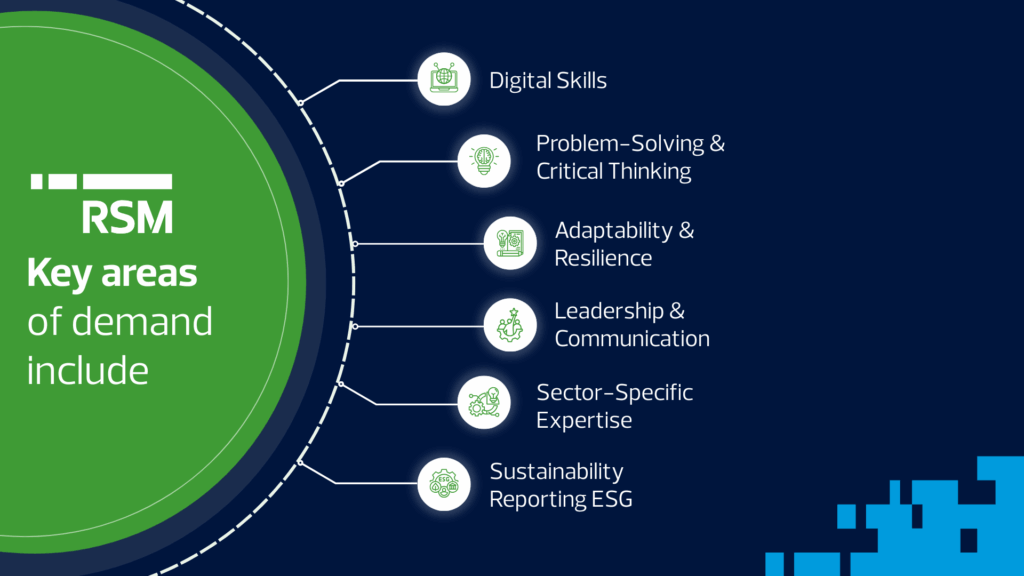
Key areas of demand include:
- Digital Skills: From foundational digital literacy to more advanced competencies in data analysis, cybersecurity awareness, cloud computing, and digital marketing. As the Kingdom pushes for greater digitalization across government and business, these skills are non-negotiable.
- Problem-Solving & Critical Thinking: The ability to analyze complex situations, identify root causes, and devise effective solutions is paramount in dynamic environments.
- Adaptability & Resilience: Employees must be able to quickly learn new tools, processes, and respond effectively to change.
- Leadership & Communication: Developing strong local leaders who can inspire teams, foster collaboration, and effectively communicate Vision 2030’s objectives within their organizations.
- Sector-Specific Expertise: As new industries flourish, specialized skills in areas like sustainable tourism, renewable energy technologies, advanced logistics, and FinTech are in high demand.
- Sustainability Reporting ESG: We are considered one of the key regional references as an accredited training center for the GRI organization, contributing to raising global awareness about the importance of and methods for preparing sustainability reports.
Businesses that proactively identify these gaps within their existing workforce and invest in targeted training are building a competitive edge, ensuring they have the internal capabilities to innovate and thrive.
3. Strategic Upskilling in Action: Delivering Real Impact
Delivering Real Impact and development. It’s about designing programs that directly address identified skill gaps and align with specific business objectives and Vision 2030 priorities, using non-traditional training methods based on interaction, collaboration, and case study analysis.
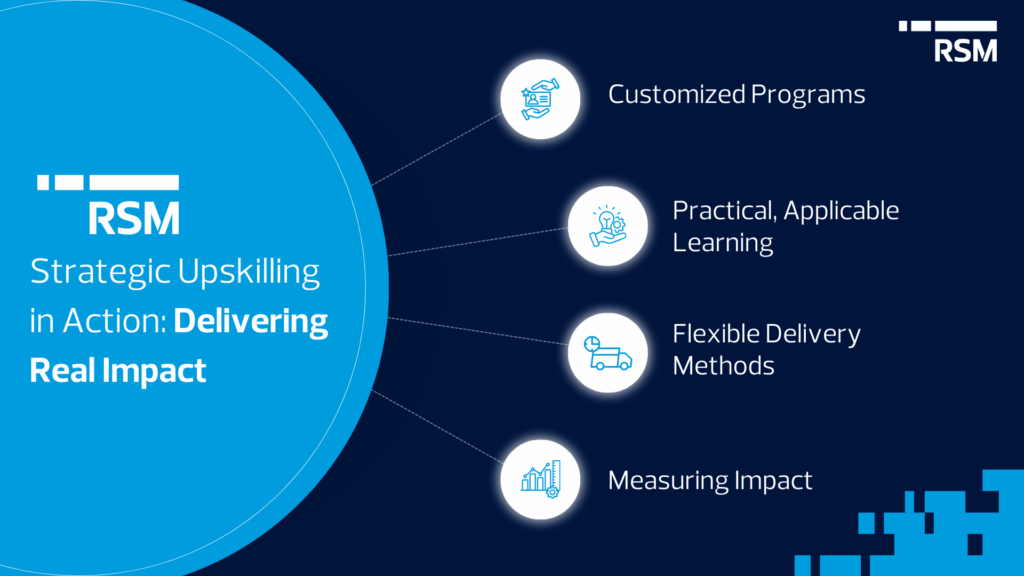
This involves several key elements:
- Customized Programs: Off-the-shelf training often misses the mark. Effective strategic upskilling begins with a thorough needs assessment to understand the unique challenges, current skill levels, and future requirements of a specific organization or department. Training content is then developed or adapted to be highly relevant to their industry, corporate culture, and operational context. For instance, a program for a logistics company would focus on supply chain optimization and digital logistics tools, whereas one for a tourism entity would emphasize hospitality management and customer experience in a digital age.
- Practical, Applicable Learning: Theory alone is insufficient. Strategic upskilling emphasizes hands-on exercises, real-world case studies rooted in the Saudi business environment, simulations, and opportunities for immediate application of learned skills. This ensures knowledge is transferred effectively into tangible improvements in performance.
- Flexible Delivery Methods: Recognizing the demands on a professional workforce, effective programs offer flexibility. This can include blended learning approaches combining online modules with in-person workshops, virtual instructor-led training (VILT), and bite-sized microlearning modules that fit into busy schedules. The training is delivered by a select group of trainers who combine academic and practical experience and hold certified TOT, providing both face-to-face and virtual training options.
- Measuring Impact: Strategic upskilling goes beyond mere attendance; it focuses on measurable outcomes. This includes tracking skill improvements, performance indicators, employee engagement, and ultimately, tangible contributions to business goals such as increased productivity, reduced operational costs, or enhanced innovation. Assessments are diverse and tailored to the nature of the participants, encompassing pre- and post-training evaluations, comprehensive training assessments, and performance improvement reporting to clients, thereby making them true partners and contributors in enhancing the effectiveness of the training process.
By investing in such targeted, high-impact training, Saudi businesses can unlock significant benefits:
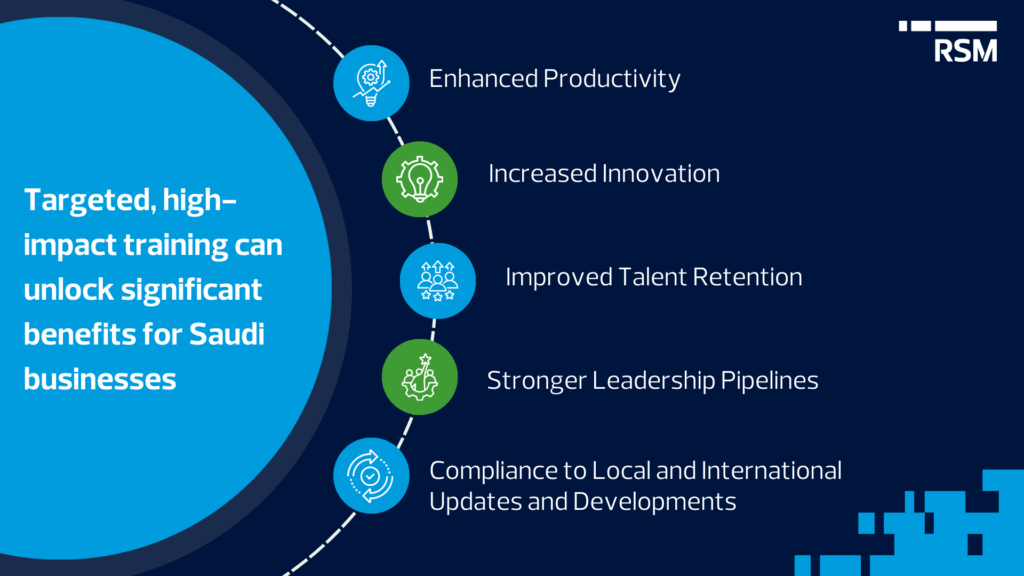
- Enhanced Productivity: A more skilled workforce operates more efficiently and effectively.
- Increased Innovation: Employees equipped with critical thinking and problem-solving skills are more likely to contribute to new ideas and solutions.
- Improved Talent Retention: Employees who feel invested in and see opportunities for growth are more likely to stay with their organization.
- Stronger Leadership Pipelines: Developing internal talent ensures a sustainable supply of future leaders capable of guiding the organization through Vision 2030.
- Compliance to Local and International Updates and Developments: This ensures that the business remains more accountable and aligned with the diverse interests and expectations of its stakeholders.
Your Partner in Vision 2030 Human Capital Development
Saudi Arabia’s journey towards Vision 2030 is an exciting and challenging one, demanding a workforce that is adaptable, digitally literate, and highly skilled. For businesses, moving “beyond compliance” and embracing strategic upskilling is no longer an option but a crucial imperative for sustainable growth and success.
Are you ready to strategically upskill your workforce for Vision 2030 success? RSM Saudi Arabia Professional Academy specializes in designing bespoke training solutions that align directly with your business objectives and national priorities. We work with you to understand your unique needs and develop programs that deliver measurable impact.
Contact us today for a free consultation to assess your team’s unique upskilling needs and discover how we can accelerate your journey towards a future-ready workforce.
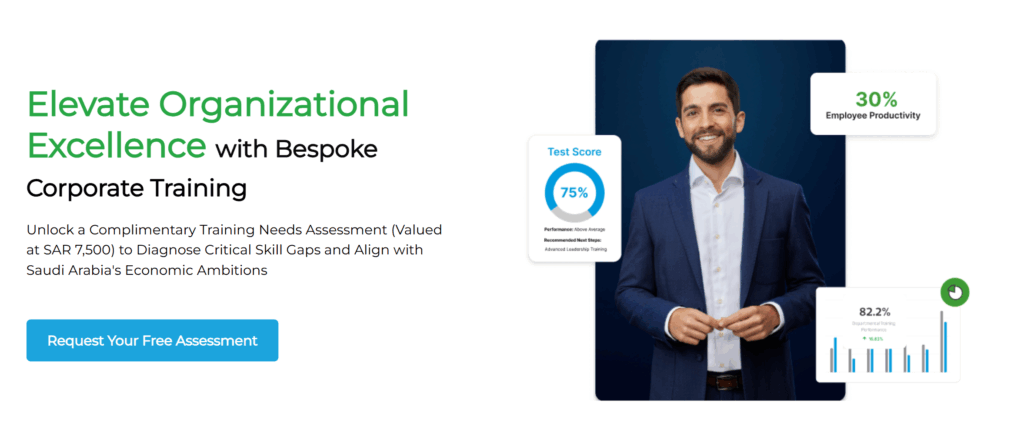


this reflects the pivotal role of human capability development within the framework of Saudi Arabia’s Vision 2030, highlighting the Human Capability Development Program as a cornerstone for enhancing the global competitiveness of national talents. It also addresses the rapid economic transformations and the emergence of new sectors that require specialized skills, emphasizing Saudization as a strategic opportunity to invest in developing local talent. Furthermore, this also underscores the urgent need to bridge the skills gap by fostering a balance between technical and soft skills to meet the evolving demands of the labor market.